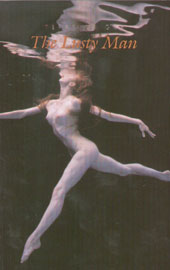The Porcupine's Quill
Celebrating forty years on the Main Street
of Erin Village, Wellington County
BOOKS IN PRINT
The Lusty Man by Terry Griggs
The Lusty Man is a novel experience indeed. It is rather like watching the frozen activity of a Hieronymus Bosch painting or seeing a Breugel explode into manic life.
Terry Griggs’s first novel is a comic extravaganza of life in an island community. It is also about the lake surrounding that island, about water itself. The events of the novel are weirdly refracted. This is the story of a christening, a portrait of a community, a story of a quest -- the search for the Lusty Man, an iron-age Celtic fertility figure transported to these shores in the nineteenth century, which presides over the novel’s loving, quarrelling, and begetting.
The story revolves around members of the Stink family who live in unwholesome closeness at the clan home in Stinkville, Belchie Township, and in satellite mobile homes. Chet Stink plays ‘Jingle Bells’ by hitting diverse portions of his skull with a wrench; Tennessee Ernie Stink practices fire-swallowing with a BBQ-starter and a marshmallow on a toasting fork; the entire pack is reputed to live on road-kill. Into these lives and through them drift angels, ghosts, and an androgynous school teacher whose subversive methodology renders intriguing consequences.
The Lusty Man is a novel experience indeed.
Review quote
‘The Lusty Man is a very different kind of book, a Rabelaisian romp, a roaring whirl. The comedic Terry Griggs conducts a veritable ‘three-ring circus,’ to use Ruthie Stink’s words, as a hapless quasi-scholar from Toronto (where else?), with the hegemonic name of Innis C. George (a comic fusion of the names of Canadian scholars Harold Innis and George Grant, no doubt), penetrates a Northern Ontario island community in search of an ancient Celtic fertility figure, the ‘‘lusty man’’ of the title. Unceremoniously dunked into the lake upon arrival, red Triumph TR4 and all (at which point he loses his lucky charm, a stone penis glued to his dashboard -- so much for the virility of academic men), Innis is rescued and reborn into a raucous world dominated by the Stink family, a clan wherein fertility is hardly a symbolic issue. For the Stinks are real-life lusty men. They exude body heat, and those around them sooner or later capitulate to the bawdy as if the very atmosphere about them is saturated with irresistible male pheremones. Ruthie Stronghill marries Gram Stink in spite of the fact that his hands smell of dog food, because he simply makes her ‘‘eyes pop out’’ and her body ‘‘say howdy.’’ Young Rita Cabel seeks her own entry into the world of lusty men via membership in the all-male ‘‘Snakes Club.’’ Even the resident nun, Sister St. Anne, takes a flying leap into carnal temporality before the story ends.’
—Canadian Literature
Discussion question for Reading Group Guide
Water -- the lake, the font, the rain -- makes frequent appearances throughout the novel. What role do you think water plays in The Lusty Man? What might it signify and how does its significance change over time? How do different characters interact with water (for example, Holmes or Rita)?
When Innis finally meets Holmes by the lake, the characters are eerily parallel. ‘Decapitated by the waterline, staring at each other as if through a fog, trying to discern some mirrored and recognizable feature. Blood brothers? Water brothers? ... Treasure hunter, they thought simultaneously, and none too kindly.’ Why does Griggs establish this parallelism? Are Innis and Holmes marked more by their similarities or by their differences?
It could be said that language itself is a character in this novel: it is fickle, playful and very opinionated. Do you agree? How do wordplay and language affect your opinions of other characters and the story as a whole? How would you characterize the narrator?
Humour and violence often go hand-in-hand in The Lusty Man. How does Griggs use humour? How does humour change your understanding of the novel’s scenes of sexual and physical violence?
Russian critic Mikhail Bakhtin coined the term ‘carnivalesque’ to describe a literary mode that ‘subverts and liberates the assumptions of the dominant style or atmosphere through humour and chaos.’ How does Griggs use carnivalesque elements in The Lusty Man? Consider her treatment of religion, such as Vic’s painting and re-painting saints, or Rita’s sinister guardian angel. What is the ‘dominant style’ that Griggs might be subverting?
Miscommunication is a recurring problem with the spoken word, clearest in Roger Christopher’s rule at the bar: ‘If you can’t spell a drink, you can’t have it.’ His patrons misspell, mishear and mispronounce. Discuss the role of speech and miscommunication in the novel. How does Griggs treat speech as opposed to the written word? Consider Holmes and Rita’s game of inventing new words.
Every character in The Lusty Man has an ambiguous relationship with sex and sexuality. How does sex affect the lives of characters? Do you think Griggs presents sex as conclusively positive or negative? What is the significance of the archaeological fertility finds, such as the stone breasts or phallus? What might Griggs be saying about human nature?
Innis thinks highly of the stone phallus: ‘[He] imagined [the statue’s] long trajectory through history, stiff as a bat, true as an arrow, its ancient magic and power still intact.’ Despite at least this man’s conventional view of phallic power, more often than not it is the women in hot pursuit of their men; for example, LaBelle recollects her first encounter with her future husband as entirely initiated by herself: ‘... I near choked when I caught sight of him. Did he look good, shirt off, all shiny with sweat. Big chest. Mmph. I couldn’t stand it.... I started to run, and that’s when he saw me. Coming at him full speed ahead. He looked kinda scared.’ How does Griggs represent the relationship between genders in The Lusty Man? How does she complicate gender difference and gender convention? How do characters like Roger Christopher and Rita fit into or complicate gender roles in The Lusty Man?
One review of The Lusty Man praises Griggs’s creation of a ‘comic geography’. What do you think the reviewer meant? How does the setting -- from Stinkville to the lake -- affect the novel?
Dick the dog saves Rita’s life. Gulls, roaches and snakes also make appearances. Discuss the significance of animals to your understanding of the human elements in The Lusty Man.
Who is the lusty man? What does he lust for?
Terry Griggs’s first book, Quickening, was nominated for the Governor General’s Award in 1991. She has published in magazines and anthologies, including The Journey Prize Anthology and Writing Home: A PEN Anthology. She has also written one literary mystery novel and a novel for young adults, and won the Marion Engel Award in 2003. She is also the author of a trilogy of children’s books, Cat’s Eye Corner, The Silver Door, and Invisible Ink. Terry Griggs lives in Stratford, Ontario.
The Porcupine's Quill would like to acknowledge the support of the Ontario Arts Council and the Canada Council for the Arts for our publishing program. The financial support of the Government of Canada through the Canada Book Fund (CBF) is also gratefully acknowledged.





